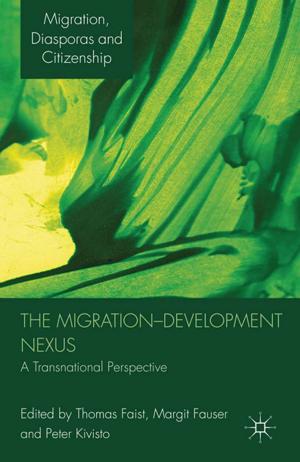Race, Place and the Seaside
Postcards from the Edge
Nonfiction, Social & Cultural Studies, Social Science, Cultural Studies, Ethnic Studies, Sociology| Author: | Daniel Burdsey | ISBN: | 9781137450128 |
| Publisher: | Palgrave Macmillan UK | Publication: | August 18, 2016 |
| Imprint: | Palgrave Macmillan | Language: | English |
| Author: | Daniel Burdsey |
| ISBN: | 9781137450128 |
| Publisher: | Palgrave Macmillan UK |
| Publication: | August 18, 2016 |
| Imprint: | Palgrave Macmillan |
| Language: | English |
This is the first academic monograph to focus exclusively on issues of race, ethnicity, whiteness and multiculture at the English seaside. The book calls for acknowledgement of the racialised nature of this environment, and proposes that its distinctive spaces, places, traditions and narratives should be included within broader analyses of race in contemporary Britain. Introducing the concept of ‘coastal liquidity’ to explain shifting ethno-racial demographics, migratory politics and spatial dynamics at the edge of the sea, along with the relative im/mobilities of the minority ethnic communities who move and reside there, the author provides a relational exploration of seaside experiences: both as a locus of racialised categorisation, exclusion and subjugation, and one of resistance, conviviality and intercultural exchange. Combining theoretical insight and empirical fieldwork, the book disrupts dominant thinking that fixes ontologically minority ethnic bodies to urban spaces, and overcomes their erasure and silencing from the seaside landscapes of the popular imagination.
This is the first academic monograph to focus exclusively on issues of race, ethnicity, whiteness and multiculture at the English seaside. The book calls for acknowledgement of the racialised nature of this environment, and proposes that its distinctive spaces, places, traditions and narratives should be included within broader analyses of race in contemporary Britain. Introducing the concept of ‘coastal liquidity’ to explain shifting ethno-racial demographics, migratory politics and spatial dynamics at the edge of the sea, along with the relative im/mobilities of the minority ethnic communities who move and reside there, the author provides a relational exploration of seaside experiences: both as a locus of racialised categorisation, exclusion and subjugation, and one of resistance, conviviality and intercultural exchange. Combining theoretical insight and empirical fieldwork, the book disrupts dominant thinking that fixes ontologically minority ethnic bodies to urban spaces, and overcomes their erasure and silencing from the seaside landscapes of the popular imagination.















